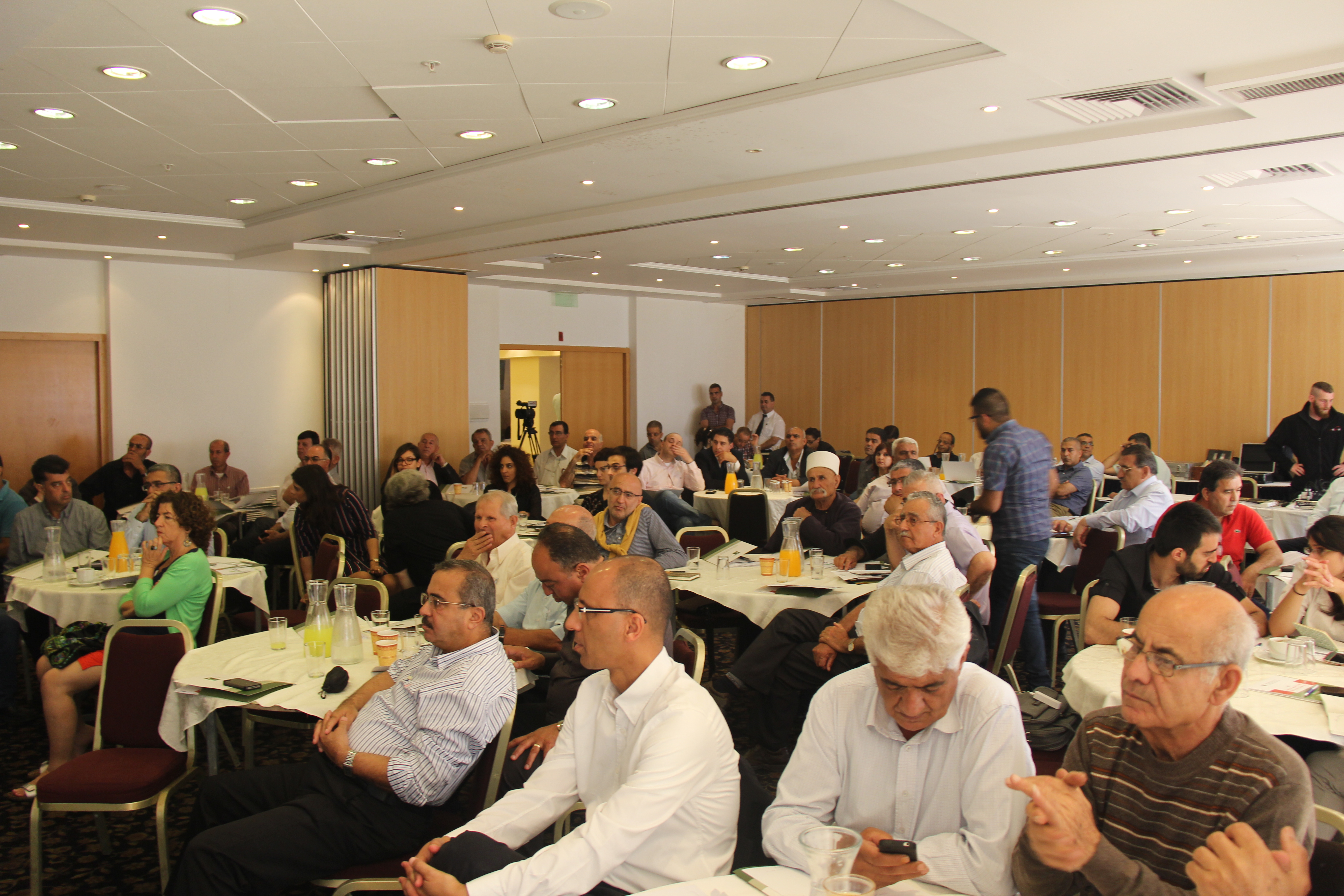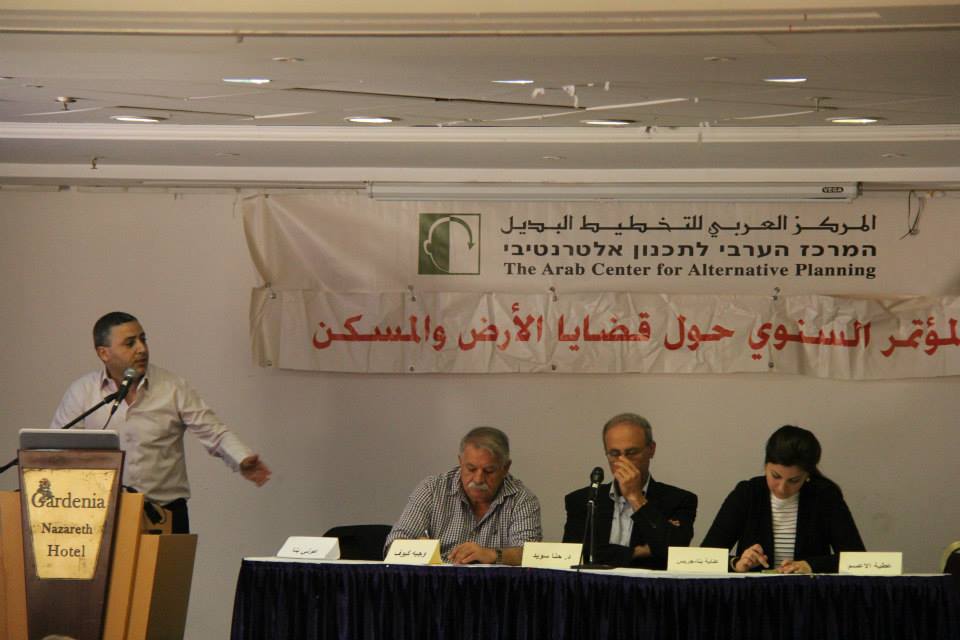Publishing date: 05/06/2015
On May 7, 2015, the Arab Center for Alternative Planning (ACAP), in partnership with the National Committee for Arab Mayors and the Association for Civil Rights in Israel, held its 15th Annual Land and Planning Conference in Gardenia Hotel, Nazareth. Over 120 individuals participated in the event, including Arab mayors, lawyers, engineers, planners, community activists, Knesset members, NGO representatives, journalists, local public committee representatives, and others. This year's conference theme was two-fold: (1) The Empowerment of Arab Local Authorities in Sustainable Planning and Urban Development and (2) The Recent Wave of House Demolitions and Alternative Solutions to the Issue.
The conference was opened by Mr. Samer Swaid, administrative manager of ACAP, who welcomed all participants in the conference, and particularly thanked the representatives from the European Commission and the Rosa Luxemburg Foundation for their financial support which made the conference possible.
The first session of the conference focused on Planning policies- between local and national. Advocate Awni Banna, from ACRI, facilitated the session. He opened the session emphasizing that the session will not only discuss issues related to discrimination that the Arab community faces in land and planning issues, but will provide recommendations and solutions to confront this discriminatory policy.
The first lecture of the session was given by Mr. Wajeh Kayuf, mayor of Issifya Local Council and member of the National Council for Planning and Building. As an Arab representative on the National Council for Planning and Building, he stressed that aside from ACAP, he is not approached by the Arab community with demands and questions, and this is a fatal mistake because Arabs must be involved in the actual planning process, and not only after planning policies and decisions are made. Unfortunately, Arab local municipalities do not properly take on this responsibility and role as required. Thus, ACAP's role is critical as a professional planning organization.
Then came the first word in this meeting, Mr. Wajih Kayuf head of the local Isfiya Council and member of the National Council for Planning and Construction, which he said was as a member of this task the Commission does not receive directives from the Arab community to follow in kind schemes only of the Arab Center for Alternative Planning, and this is a fatal error because it must follow up charts of put in the planning stage and not institutions after approval and this is not the important role played by local authorities as required, and must be taken in its role as it should, and the exploitation of the role of the Arab Center for Alternative Planning of what is owned by a professional capacities installed.
Mr. Emad Dahle, mayor of Toran, presented the 2nd lecture on Toran's experience of Judaization through settlements, the "Shibolot" case. He described the Shibolot plan that would confiscate land from the city of Toran, the process of approaching ACAP and together submitting a legal objection against the plan. The professional work of ACAP led to a major achievement which involved the rejection of the plan.
Dr. Hanna Swaid from ACAP lectured on: The policy of house demolitions, its implications, and how to deal with it. Dr. Swaid thanked the participants and urged mayors and members of councils to play an important role in the planning of their townships. He thanked the professional work of ACAP's staff and stressed that the organizing such an annual conference for 15 years in a row shows ACAP persistence and systematic work on issues related to land and housing. Dr. Swaid emphasized that the joint Arab party must work towards promoting important issues in land and housing. Dr. Swaid presented important data on house demolitions in four different areas: (1) the Negev; (2) Halal villages (Dahmash, Mansoura, Sarkis and others); (3) spontaneous neighborhoods in Arab towns (neighborhoods that were build without planning; and (4) individual private houses. He presented the scope of the phenomenon of house demolitions: 10,000 houses in the Negev, between 1000-2000 houses in Halal, between 15,000-20,000 in the spontaneous neighborhoods, and tens of individual houses. There are a total of about 250,000-300,000 houses; thus 1 in every 10 Arab houses do not have proper licenses. The houses that are presently under the threat of demolition are those in the Halal, and the individual houses. So we are speaking about between 1000 to 2000 houses. The individual houses are under threat because the State institutions will not demolish integrated entire neighborhoods. Swaid presented various recommendations to solve the serious problem. In the Negev, this solution comes from the government. In terms of the Halal villages, the solution can come from the Ministry of Interior, who has the power to recognize these villages. In regards to the spontaneous neighborhoods and the individual houses, the solution lies in the hands of the planning committees.
ACAP's urban planner, Enaya Banna-Geries, lectured on the right to adequate housing, the housing crisis in the Arab community and possible solutions. She invited the participants to visit ACAP's website to learn more details and data on the issue. Banna-Geries presented the research and data collected on housing that were presented in front of the mini-Ministerial Committee. Following ACAP's presentation of the housing crisis to the State, they created the Ministry Committee 120 to follow-up on planning and housing issues in the Arab community. An additional committee was set up to examine "illegal" house building. She confirmed that 85% of the Arab population lives in separate towns; Arabs comprise 17% of the total population and live on only 3.5% of the land. The price of housing has significantly risen in the Arab towns, over 450%. Arab citizens need to pay 190 monthly salaries in order to buy housing, which is much higher than the national average of 145 monthly salaries.
Banna-Geries discussed the problems of planning and presented data related to Arab citizens receiving building permits. In 2013 in the Northern District, 22,823 housing unit permits were approved; only 1241 were in Arab townships. It is important to mention that Arabs comprise 52% of the citizens in the Northern District, living in 83 towns. The 1241 approved housing units were only in 8 Arab towns! Thus, 75 Arab towns remained without approved housing units.
Banna-Geries discussed discrimination in governmental programs that aimed to resolve housing problems, which do not apply to Arab towns because they are not appropriate to the type of building and characteristics of Arab towns, including private owned land.
To conclude, Banna-Geries presented recommendations that could alleviate the housing problem in Arab towns. ACAP has developed an alternative plan that proposes 160,000 housing units in various geographic areas, which meets the needs of the growing population up to the year 2020 (research has shown that only 50% of the planning will actually be implemented), special licensed zones, independent planning committees for towns with a population of more than 20,000, and "urban modernization" programs in Arab towns.
In regards to the marketing of land, Banna-Geries suggested the following recommendations: increase the available offers of land on the market in Arab towns, inclusion of Arab towns within all plans that aim to reduce the prices of apartments and housing units, discussion of building on private lands, changes in the policies regarding bidding, and create solutions for achieving appropriate housing in Arab towns. She also emphasized the need for providing special grants to Arab citizens for housing and changing the loan process to make it more affordable for Arab citizens to buy and rent houses.
The second session was a round table to discuss the latest planning developments, and to hear suggestions about possible solutions to planning problems in Arab towns. The session was facilitated by journalist Jackie Khoury. The session opened up with advocate Maysan Mourani from Adallah discussing the latest developments in the case of Atir Im Al-Heiran, in which the Supreme Court decided to evacuate its citizens. MK Yousef Jabarin raised his concerns regarding the impact of "crew 120" because it does not address the Negev and mixed urban issues, and furthermore does not have any Arab representation. In addition, during the same period, a new committee has been appointed by the Minister of Interior to follow up the implementation of house demolition cases.
MK Masoud Ghanayem discussed his work related to issues of land and housing. He emphasized that the Knesset members are focusing efforts on the issue and cooperating with local public committees. MK Haneen Zoabi stated that we are dealing with an ideological project as the core of the conflict. She talked about the three tracks: professional, judicial, and popular, which address house demolitions and expansion of jurisdiction areas.
Mr. Arafat Ismail and Mr. Ahmed Melhem represented the local public committees in Wadi Ara. Mr. Fahmi Halabi, representing the Druze Committee for the defense of land and housing, and stressed that there is a need to move forward with alternative plans. Dr. Zuhair Tibi, from the local public committee in Taybeh, discussed the latest work that they are doing and the planning problems in the area; he stressed that there are 600 houses without legal permits and under the threat of demolition. He also said that we can not expect the young to pay 1.5 million NIS in order to build a house with permits.
The round table ended with dialogue and discussion between professionals, mayors and local public committees about their experience and their diagnosis of the problem and propose solutions. They agreed for the need to develop a strategic long term plan, led by the Arab Center for Alternative Planning, to deal with these predominant planning problems in Arab towns and provide appropriate solutions.


